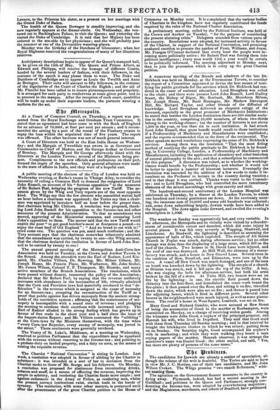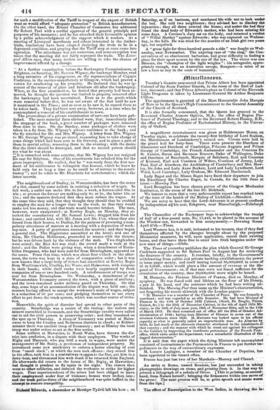bt 1j3robintts. The candidates for Ipswich are already a matter of
speculation, al- though the reissue of the writ is doubtful. The Tories are said to have in pew Mr. J. C. Herries, one of their late candidates, and Mr. John Wilson Croker. The Whigs promise "two stanch Reformers," with- out naming them. The agitation on the Government finance measures in the country is dying away. Plymouth, indeed, has had a second meeting in the Guildhall ; and petitions to the Queen and Parliament, strongly.c.on- demning the Income-tax, were adopted by overwhelming majorities ; and the Magistrates, merchants, and others of Bradford, have petitioned for such a modification of the Tariff in respect of the export of British wool as would afford "adequate protection" to British manufacturers. On the other hand, the Bristol Chamber of Commerce has addressed Sir Robert Peel with a cordial approval of the general principle and purposes of his measures ; and be has clenched their favourable opinion by a polite acknowledgment of the support which it renders. At a meeting of Liverpool merchants and others interested in the timber- trade, resolutions have been adoptcd declaring the trade to be in a depressed condition, and praying that the Tariff may at once come into operation. The attendance was not numerous, and some exception was taken that the meeting did not fairly represent the trade. The Litier- pool Albion says, that many traders are willing to take the chance of improvement offered by a change.
At a further examination before the Bankruptcy Commissioners, at Brighton, on Saturday, Mr. Newton Wigney, the bankrupt Member, read a long narrative of his engagement, on the representations of Captain Cochrane, in the merino-manufactory at Glasgow, which had proved a vortex for swallowing up his property. He declared that he was ig- norant of the removal of plate and furniture till after the bankruptcy. When, at the first examination, he denied that property had been re- moved, he thought the question was limited to property removed after the bankruptcy had been ascertained. Even as to the goods which were removed before that, he was not aware of the fact until he saw it mentioned in the Times; and as soon as he saw it, he caused them to be taken back. They had been sent away, however, at a time when he contemplated a removal of his establishment to town. The proceedings of a private examination of servants have been pub- lished. The most material facts elicited were, that, immediately after the stoppage of the bank, a great number of packages were removed from time to time. On the Sunday, some packages of clothes were taken in a fly from Mr. Wigney's private residence to the bank ; and the Ely returned for Mr. and Mrs. Wigney. A letter from Mrs. Wigney to Mr. George Wigney was produced, requesting him to take charge of eome things which had been sent to his brewery, and to place a part of them in special safety, removing them in the evening; with the desire that the letter should be destroyed, and that no second person should see what he was about.
It is remarked with some surprise, that Mr. Wigney has not resigned his seat for Brighton. One of his constituents has rebuked him for the gross impropriety. He replied, that he " was ready from the first mo- ment of his misfortunes to relinquish that honour, which he knew he held only for so long a time as he could be of service to the consti- tuency "; and he refers to Mr. Heaviside for corroboration ; which the latter accords. -
The neighbourhood of Dudley, in Worcestershire, has been the scene of a riot, caused by some nailers in resisting a reduction of wages. In full work, a nailer can make 20s. to 24s. a week, a horsen-ailer 30s. to 40g.; at present the former are making only 8s. or 9s., the latter 13s. or 15s.; and the masters declared that they must reduce the wages. At the same time they said, that they thought they should thus be enabled to employ the men for a longer time in the week, so that they would make not less money, and that trade would become brisker. The men, however, were exasperated : at Rowley Regis, on Monday, they at- tacked the manufactory of Mr. Samuel Lewis ; dragged him from his house; and carried him, with Mr. Jones and Mr. Cox, whom they also forced from their houses, to Dudley, for the purpose of procuring a com- pulsory attendance of masters at a meeting with a deputation of work- ing-men. A party of gentlemen rescued the masters ; and then began a general riot. The Magistrates assembled at the hotel ; and one of them, Mr. Charles Molineaux, proceeded to reason with the rioters; but he was driven back by the violence of the mob. Two ringleaders were seized ; the Riot Act was read ; the crowd made a rush at the hotel ; and the Police were giving way, when a detachment of Ennis- killen Dragoons, who had been sent for from Birmingham, appeared on the scene. From that time, which was about four o'clock in the after- noon, the town was kept in a state of comparative order ; but it was now known that a large body of rioters had assembled at Rowley Regis from Westbromwich, Cradley, Lie Waste, and Halesoweo, with weapons in their hands; while their ranks were hourly augmented by fresh companies of one or two hundred each. A reinforcement of troops was sent for from Birmingham. On Wednesday, a detachment of the Worcestershire Yeomanry entered the town, with a piece of artillery; and the town remained under military guard on Thursday. On that day, some hope of an accommodation of the dispute was held Out; the masters having offered to accept the workmen's scale of wages, subject to a reduction of 10 per cent; and pledging themselves to use every effort to put down the truck system, which was another source of irrita- tion.
Meanwhile, the spirit of disorder had spread to other parts of the country. Stourbridge was a centre of the rioting : the nailers and miners assembled in thousands, and the Stourbridge cavalry were called out to aid the civil powers in preserving order ; and they remained on the spot up to Thursday. A troop of Yeomanry was posted at Hales- owen to keep the Cradley and Netherton districts in check ; at Kidder- milliner there was another troop of Yeomanry ; and at Himley the local troop was under orders to act at the first notice.
Some colliers at Hawarden, in North Wales, have thrown the dis- trict into confusion, in a dispute with their employers. The works of Rigby and Hancock, who pay 5001. a week in wages, were under the management of Mr. Staley, a gentleman of independent property. He introduced some new machinery to enforce a better clearing of coal from "small slack"; at which the men took offence: they seized him in his office, took him in a coalrailway-waggonto the Dee, put him in a ferry-boat, and threatened him with death if he returned from England. He afterwards did return to the house of Mr. Rigby, at Hawarden ; but thought it prudent to fly again in the night. The rioters then went to other collieries, and induced the workmen to strike for higher wages. Four superintendents of the mines had been obliged to leave their employment under fear of violence ; houses were broken into ; and the weak police-force of the neighbourhood was quite baffled in the attempt to restore tranquillity.
Richard Edwards, a shoemaker at Merthyr-Tydvil left his horn on Saturday, as if on business, and cautioned his wife not to look under the bed. She told two neighbours ; they advised her to disobey the injunction : they all three entered the house; and under the bed they found the dead body of Edwards's mother, who had been missino.' for some days. A Coroner's Jury sat on the body, and returned a verdict of "Wilful Murder" against Edwards ; who was captured on Wednes- day, in the hills. He was tried for the murder of an Irish girl two years ago, but acquitted.
A "great fight for three hundred pounds aside" was fought on Wed- nesday, near Newmarket. The expiring race of "the ring," the Con- servatives of an obsolescent barbarism, had great difficulty in finding a place for their sport unseen by the eye of the law. The victor was one Broome, the "champion of the light weights " : his antagonist, appro- priately enough, was an Australian savage, Bangaree—a scion of as low a race as any in the scale of humanity.



























 Previous page
Previous page